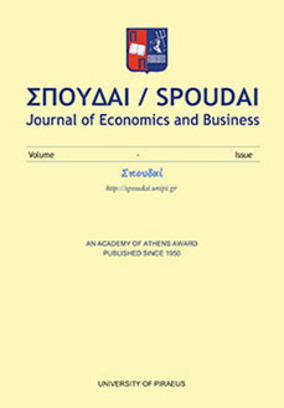An empirical investigation of outsourcing decisions in enterprises operating in Greece
Part of : Σπουδαί : journal of economics and business ; Vol.63, No.1-2, 2013, pages 31-46
Issue:
Pages:
31-46
Abstract:
This paper presents some preliminary results, regarding outsourcing decisions, based on a study, which was conducted using a sample of enterprises operating in Greece. Specifically, the motivations, the risks, and the impact, positive or negative, of outsourcing are described and analyzed. 56 companies, which operate in the trading and manufacturing sectors, participated in this research. Results indicate that cost reduction and acquisition of technology/skills are the most important motivations for outsourcing, whereas contracting-out core activities and loss of control are the most serious risks of outsourcing. Generally, the impact of outsourcing is positive, with cost reduction and increase in flexibility the mostly cited benefits.
Subject:
Subject (LC):
Keywords:
outsourcing, motivations, risks, benefits, strategic, Greece
Notes:
Περιέχει πίνακες και βιβλιογραφία
References (1):
- Alexander, M., Young, D., 1996a. Outsourcing: where’s the value? Long Range Planning 29(5),728–730.Alexander, M., Young, D., 1996b. Strategic outsourcing. Long Range Planning 29(1), 116–119.Anderson, M. C., 1997. A primer in measuring outsourcing results. National Productivity Review17(1), 33–41.Arnold, U., 2000. New dimensions of outsourcing: a combination of transaction cost economics and thecore competencies concept. European Journal of Purchasing & Supply Management 6(1), 23–29.Barthe΄lemy, J., 2003. The seven deadly sins of outsourcing. Academy of Management Executive17(2), 87–98.Belcourt, M., 2006. Outsourcing — The benefits and the risks. Human Resource Management Review16(2), 269–279.Blumberg, D. F., 1998. Strategic assessment of outsourcing and downsizing in the service market.Managing Service Quality 8(1), 5–18.Embleton, P. R., Wright, P. C., 1998. A practical guide to successful outsourcing. Empowermentin Organizations 6(3), 94–106.Espino-Rodríguez, T. F., 2004. The tendency to outsource hotel operations: strategic reasons andrelationship to activity performance and size. Tourism Review 59(2), 17–25.Gilley, K. M., Rasheed, A., 2000. Making more by doing less: an analysis of outsourcing and its effectson firm performance. Journal of Management 26(4), 763–790.Harland, C., Knight, L., Lamming, R., Walker, H., 2005. Outsourcing: assessing the risks and benefitsfor organisations, sectors and nations. International Journal of Operations & ProductionManagement 25(9), 831–850.Heikkila.., J., Cordon, C., 2002. Outsourcing: a core or non-core strategic management decision?Strategic Change 11(4), 183–193.Hussey, D., Jenster, P., 2003. Outsourcing: the supplier viewpoint. Strategic Change 12(1), 7–20.Jennings, D., 2002. Strategic sourcing: benefits, problems and a contextual model. ManagementDecision 40(1), 26–34.Kakabadse, A., Kakabadse, N., 2000a. Sourcing: new face to economies of scale and the emergenceof new organizational forms. Knowledge and Process Management 7(2), 107–118.Kakabadse, A., Kakabadse, N., 2000b. Critical review – outsourcing: a paradigm shift. Journal ofManagement Development 19(8), 670–728.Kakabadse, A., Kakabadse, N., 2005. Outsourcing: current and future trends. Thunderbird InternationalBusiness Review 47(2), 183–204.Kremic, T., Tukel, O. I., Rom, W. O., 2006. Outsourcing decision support: a survey of benefits, risks,and decision factors. Supply Chain Management: An International Journal 11(6), 467–482.Lonsdale, C., 1999. Effectively managing vertical supply relationships: a risk management modelfor outsourcing. Supply Chain Management: An International Journal 4(4), 176–183.McIvor, R., 2000. A practical framework for understanding the outsourcing process. Supply ChainManagement: An International Journal 5(1), 22–36.McIvor, R., 2005. The Outsourcing Process: Strategies for Evaluation and Management. Cambridge:Cambridge Univ. Press.Monczka, R. M., Markham, W. J., Blascovich, J. D., Kearney, A., Slaight, I. T. H., 2005. Outsourcingstrategically for sustainable competitive advantage. Center for Advanced Purchasing Studiesand A.T. Kearney, Inc.Quinn, J. B., Hilmer, F. G., 1994. Strategic outsourcing. Sloan Management Review 35(4), 43–55.Que΄lin, B. V., Duhamel, F., 2003. Bringing together strategic outsourcing and corporate strategy:outsourcing motives and risks. European Management Journal 21(5), 647–661.Razzaque, M. A., Sheng, C. C., 1998. Outsourcing of logistics functions: a literature survey. InternationalJournal of Physical Distribution and Logistics Management 28(2), 89–107.Schwyn, R., 1999. How to approach IT outsourcing. Health Management Technology 20(6), 28-31.Willcocks, L. P., Currie, W. L., 1997. Information technology in public services: towards the contractualorganization? British Journal of Management 8(1), S107–120.




